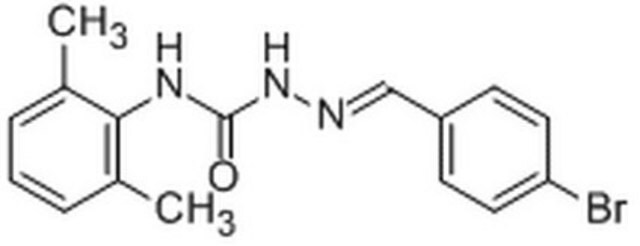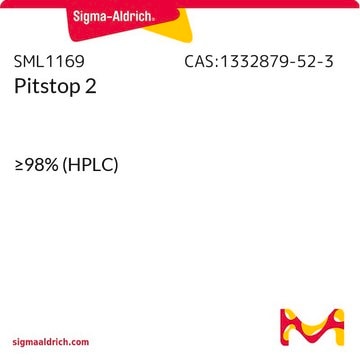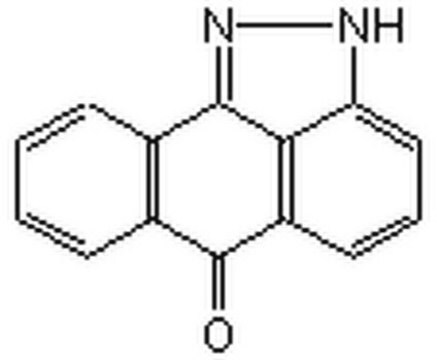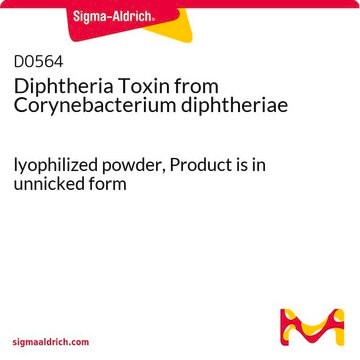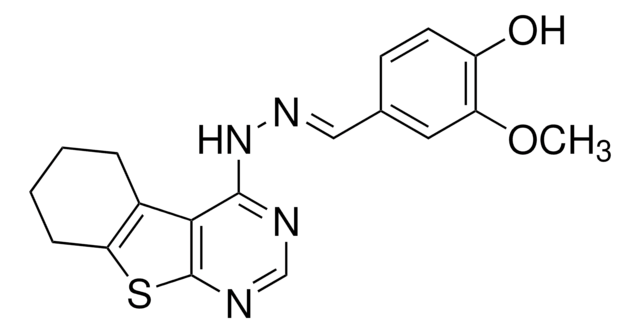SML1006
EGA
≥98% (HPLC)
Synonym(s):
2-[(4-Bromophenyl)methylene]-N-(2,6-dimethylphenyl)-hydrazinecarboxamide
Sign Into View Organizational & Contract Pricing
All Photos(1)
About This Item
Empirical Formula (Hill Notation):
C16H16BrN3O
CAS Number:
Molecular Weight:
346.22
UNSPSC Code:
12352200
NACRES:
NA.77
Recommended Products
Assay
≥98% (HPLC)
form
powder
color
white to beige
solubility
DMSO: 5 mg/vial, clear (warmed)
storage temp.
2-8°C
Biochem/physiol Actions
EGA is a small molecule that blocks the entry of anthrax lethal toxin by inhibiting trafficking pathways in acidified endosomes, without affecting endosome pH. EGA blocks trafficking of other toxins, including diphtheria toxin, but does not inhibit trafficking of ricin. The compound EGA attenuates lysosomal targeting and degradation of the EGF receptor, but does not block does not block endosomal recycling of transferrin.
Features and Benefits
This compound is a featured product for Cyclic Nucleotide research. Click here to discover more featured Cyclic Nucleotide products. Learn more about bioactive small molecules for other areas of research at sigma.com/discover-bsm.
Storage Class Code
11 - Combustible Solids
WGK
WGK 3
Flash Point(F)
Not applicable
Flash Point(C)
Not applicable
Certificates of Analysis (COA)
Search for Certificates of Analysis (COA) by entering the products Lot/Batch Number. Lot and Batch Numbers can be found on a product’s label following the words ‘Lot’ or ‘Batch’.
Already Own This Product?
Find documentation for the products that you have recently purchased in the Document Library.
Customers Also Viewed
Samuel J Dobson et al.
Antiviral research, 179, 104819-104819 (2020-05-12)
During virus entry, members of the Polyomaviridae transit the endolysosomal network en route to the endoplasmic reticulum (ER), from which degraded capsids escape into the cytoplasm and enter the nucleus. Emerging evidence suggests that viruses require both endosomal acidification and
Yu Wu et al.
The FEBS journal, 287(15), 3184-3199 (2020-01-05)
The endo-lysosome system is involved in endocytosis, protein sorting, and degradation as well as autophagy. Numerous toxins and pathogens exploit this system to enter host cells and exert their deleterious effects. Modulation of host endo-lysosome pathway may restrict multiple toxins
Articles
Cyclic nucleotides like cAMP modulate cell function via PKA activation and ion channels.
Our team of scientists has experience in all areas of research including Life Science, Material Science, Chemical Synthesis, Chromatography, Analytical and many others.
Contact Technical Service
